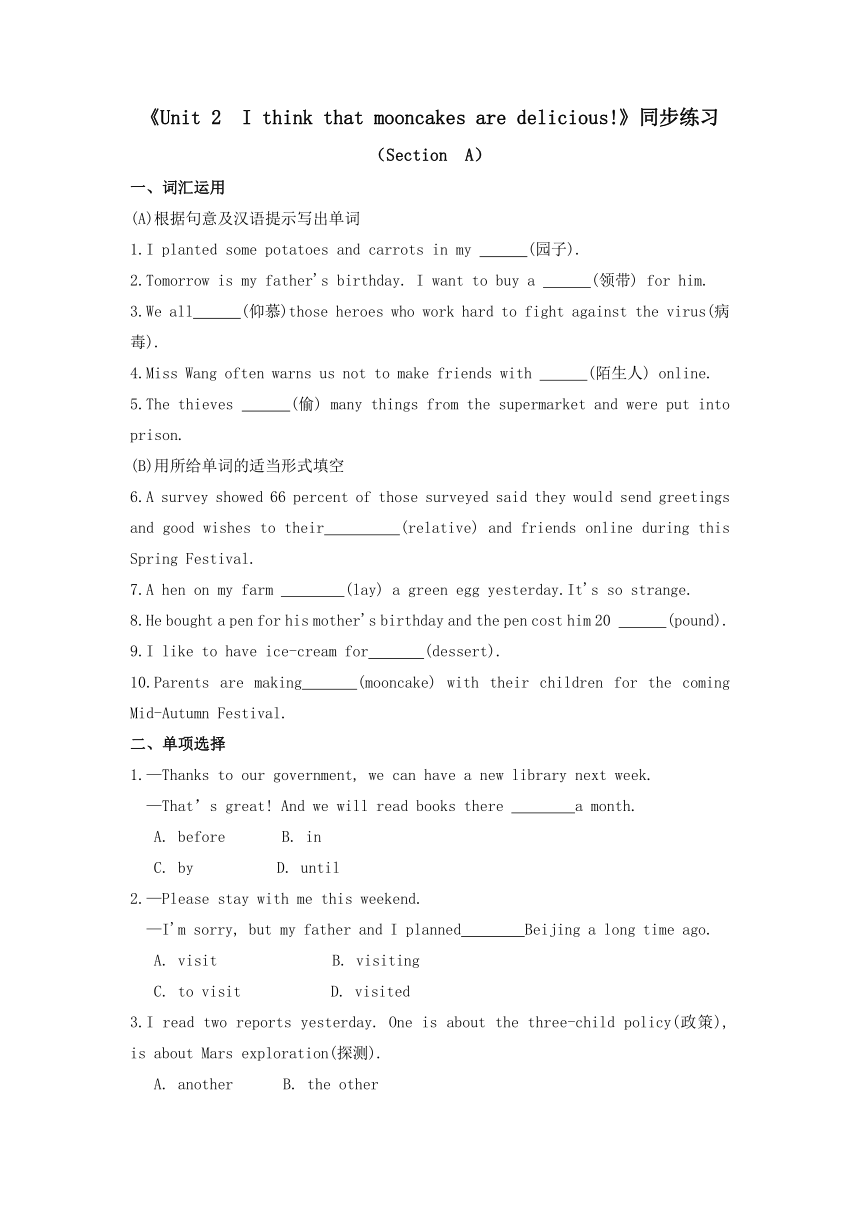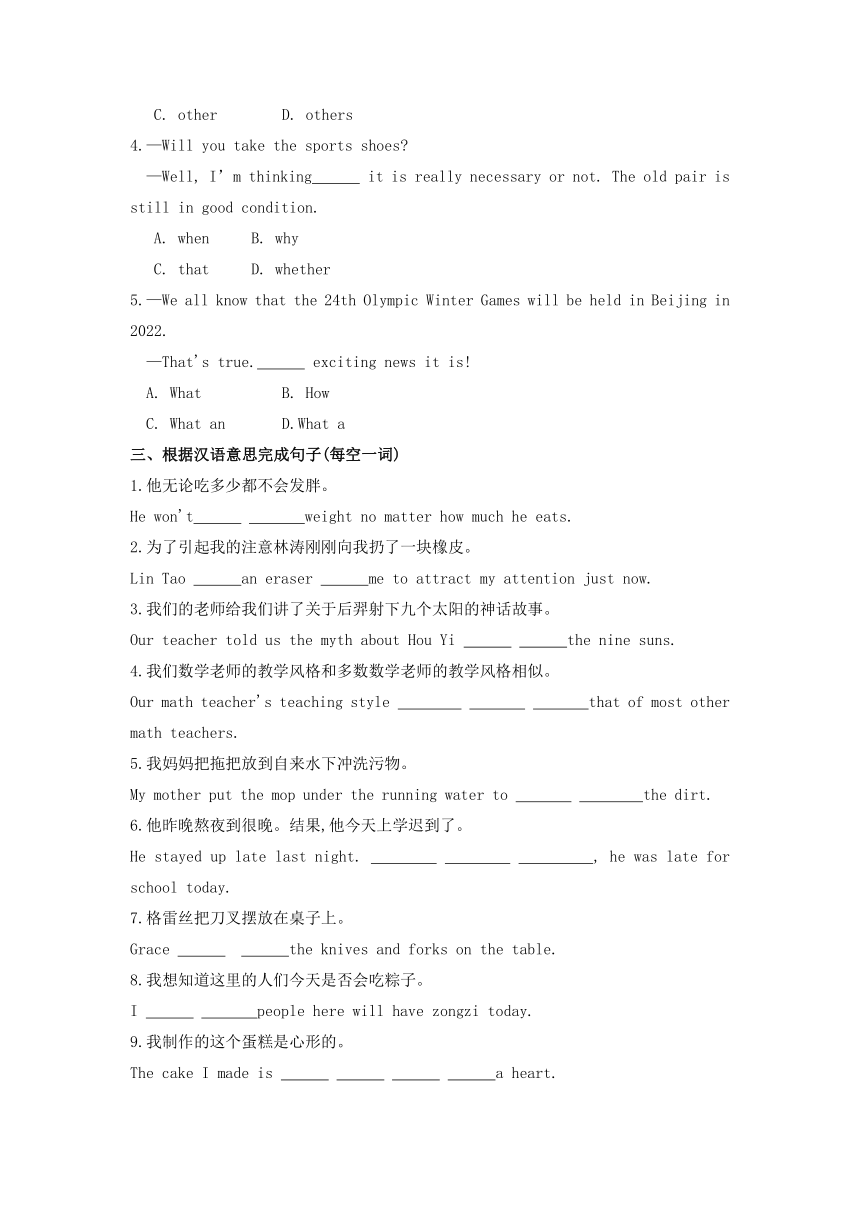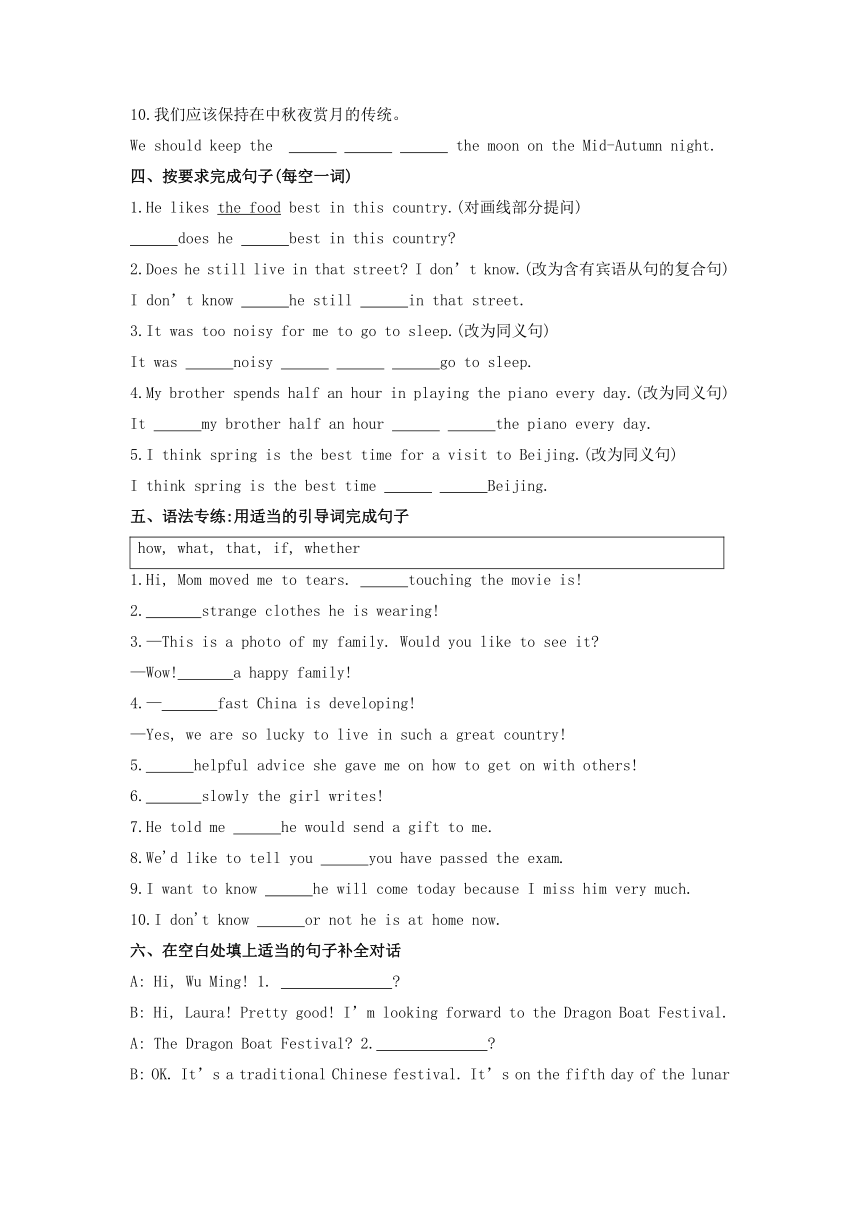Unit 2 I think that mooncakes are delicious! Section A同步练习 (含答案)
文档属性
| 名称 | Unit 2 I think that mooncakes are delicious! Section A同步练习 (含答案) |  | |
| 格式 | docx | ||
| 文件大小 | 23.1KB | ||
| 资源类型 | 教案 | ||
| 版本资源 | 人教新目标(Go for it)版 | ||
| 科目 | 英语 | ||
| 更新时间 | 2023-01-15 16:42:29 | ||
图片预览



文档简介
《Unit 2 I think that mooncakes are delicious!》同步练习
(Section A)
一、词汇运用
(A)根据句意及汉语提示写出单词
1.I planted some potatoes and carrots in my (园子).
2.Tomorrow is my father's birthday. I want to buy a (领带) for him.
3.We all (仰慕)those heroes who work hard to fight against the virus(病毒).
4.Miss Wang often warns us not to make friends with (陌生人) online.
5.The thieves (偷) many things from the supermarket and were put into prison.
(B)用所给单词的适当形式填空
6.A survey showed 66 percent of those surveyed said they would send greetings and good wishes to their (relative) and friends online during this Spring Festival.
7.A hen on my farm (lay) a green egg yesterday.It's so strange.
8.He bought a pen for his mother's birthday and the pen cost him 20 (pound).
9.I like to have ice-cream for (dessert).
10.Parents are making (mooncake) with their children for the coming Mid-Autumn Festival.
二、单项选择
1.—Thanks to our government, we can have a new library next week.
—That’s great! And we will read books there a month.
A. before B. in
C. by D. until
2.—Please stay with me this weekend.
—I'm sorry, but my father and I planned Beijing a long time ago.
A. visit B. visiting
C. to visit D. visited
3.I read two reports yesterday. One is about the three-child policy(政策), is about Mars exploration(探测).
A. another B. the other
C. other D. others
4.—Will you take the sports shoes
—Well, I’m thinking it is really necessary or not. The old pair is still in good condition.
A. when B. why
C. that D. whether
5.—We all know that the 24th Olympic Winter Games will be held in Beijing in 2022.
—That's true. exciting news it is!
A. What B. How
C. What an D.What a
三、根据汉语意思完成句子(每空一词)
1.他无论吃多少都不会发胖。
He won't weight no matter how much he eats.
2.为了引起我的注意林涛刚刚向我扔了一块橡皮。
Lin Tao an eraser me to attract my attention just now.
3.我们的老师给我们讲了关于后羿射下九个太阳的神话故事。
Our teacher told us the myth about Hou Yi the nine suns.
4.我们数学老师的教学风格和多数数学老师的教学风格相似。
Our math teacher's teaching style that of most other math teachers.
5.我妈妈把拖把放到自来水下冲洗污物。
My mother put the mop under the running water to the dirt.
6.他昨晚熬夜到很晚。结果,他今天上学迟到了。
He stayed up late last night. , he was late for school today.
7.格雷丝把刀叉摆放在桌子上。
Grace the knives and forks on the table.
8.我想知道这里的人们今天是否会吃粽子。
I people here will have zongzi today.
9.我制作的这个蛋糕是心形的。
The cake I made is a heart.
10.我们应该保持在中秋夜赏月的传统。
We should keep the the moon on the Mid-Autumn night.
四、按要求完成句子(每空一词)
1.He likes the food best in this country.(对画线部分提问)
does he best in this country
2.Does he still live in that street I don’t know.(改为含有宾语从句的复合句)
I don’t know he still in that street.
3.It was too noisy for me to go to sleep.(改为同义句)
It was noisy go to sleep.
4.My brother spends half an hour in playing the piano every day.(改为同义句)
It my brother half an hour the piano every day.
5.I think spring is the best time for a visit to Beijing.(改为同义句)
I think spring is the best time Beijing.
五、语法专练:用适当的引导词完成句子
how, what, that, if, whether
1.Hi, Mom moved me to tears. touching the movie is!
2. strange clothes he is wearing!
3.—This is a photo of my family. Would you like to see it
—Wow! a happy family!
4.— fast China is developing!
—Yes, we are so lucky to live in such a great country!
5. helpful advice she gave me on how to get on with others!
6. slowly the girl writes!
7.He told me he would send a gift to me.
8.We'd like to tell you you have passed the exam.
9.I want to know he will come today because I miss him very much.
10.I don't know or not he is at home now.
六、在空白处填上适当的句子补全对话
A: Hi, Wu Ming! 1.
B: Hi, Laura! Pretty good! I’m looking forward to the Dragon Boat Festival.
A: The Dragon Boat Festival 2.
B: OK. It’s a traditional Chinese festival. It’s on the fifth day of the lunar calendar’s(阴历的) fifth month.
A: Oh, 3.
B: To remember an ancient poet (诗人), Qu Yuan.
A: Aha, I see. 4.
B: We usually eat zongzi and watch dragon boat races on that day.
A: Zongzi They must be delicious.
B: Yes, and I really like zongzi filled with meat. But do you know what I like best about the festival
A: 5.
B: The dragon boat races. They’re exciting to watch. Maybe you can celebrate the festival with my family next week.
A: I’d love to. Thanks for your invitation.
七、阅读理解
In China, Teachers' Day was really set on September 10,1985. Now people celebrate it on September 10 every year. On this special day, students usually give their teachers thank-you cards, flowers, fruits and other small gifts to show their respect(尊重)and appreciation(感激).
In the United States, Teachers' Day is known as "National Teacher Day". It's on Tuesday during the first full week of May. The day is celebrated by students to show their appreciation for their teachers with flowers, thank-you cards and other gifts.
In India, Teachers' Day is celebrated on September 5 in honor of(为了纪念)the second president of India. September 5 is his birthday. Traditional songs are sung, poems are recited(吟诵)and dramas are performed by students.
In Russia, Teachers' Day was celebrated on the first Sunday of October between 1965 and 1994. Since 1994, the day has been celebrated on the 5th of October, the same day as World Teachers' Day. Students usually show their respect and appreciation with games, competitions, dramas, dance or little presents. Besides the activities, some schools reward(奖励)their teachers for their efforts.
Teachers' Day is celebrated in Vietnam(越南)on November 20th. It was first celebrated in 1958. Since 1982, the day has been named "Vietnamese Educators' Day". Students hold the Teachers' Day parties at their schools to celebrate it.
1. When was Teachers' Day set in China
A. In 1958. B. In 1965.
C. In 1985. D. In 1994.
2.In India, students celebrate Teachers' Day by doing the following things EXCEPT .
A. singing songs B. reciting poems
C. performing dramas D. playing games
3.In , people celebrate Teachers' Day in September.
A. China and India
B. India and Russia
C. India and the United States
D. China and Vietnam
4.Which of the following is NOT true
A. Five countries are mentioned in this passage.
B. Teachers' Day is known as "National Teacher Day" in America.
C. Teachers' Day is celebrated on the first Sunday of October in Russia now.
D. Chinese and American students give their teachers thank-you cards on Teachers' Day.
5.The passage may be from .
A. a novel B. a magazine
C. a guide book D. a notice
参考答案
一、词汇运用
1.garden 句意:我在我的园子里种植了一些土豆和胡萝卜。
2.tie 因空前有不定冠词a,故空处用可数名词的单数形式。
3.admire 句意: 我们都仰慕那些努力与病毒作斗争的英雄。此处表示一般情况,应用一般现在时,且主语是We,故用admire。
4.strangers stranger"陌生人",为可数名词,空前无限定词,故用其复数形式。
5.stole 根据"and were put"可知空处应用一般过去时,steal的过去式为stole。
6.relatives relative为可数名词,由后面的"friends"可知,空处应填relative的复数形式。
7.laid 根据时间状语yesterday可知,此处表示过去发生的事情,应用lay的过去式laid。
8.pounds 根据空前的"20"可知应用pound的复数形式。
9.dessert dessert意为"(饭后)甜点,甜食",既可作可数名词,也可作不可数名词。for dessert为固定说法。
10.mooncakes mooncake"月饼",为可数名词,此处空前无限定词,故应用其复数形式。
二、单项选择
1.B before"在……以前";in+一段时间"在……之后",用于将来时;by"到……时";until"直到……为止"。空处所在句中的"will"为将来时的标志,故选B。
2.C plan to do sth.意为"计划做某事",为固定用法。
3.B 句意:我昨天看了两篇报道。一篇是关于"三孩政策"的,另一篇是关于火星探测的。表示两者中的另一个用the other。
4.D 分析题干可知,空处引导宾语从句,根据空后的"or not"可知,应选D,在从句中表示"是否"。
5.A 感叹名词用what,news为不可数名词,故选A。
三、根据汉语意思完成句子
1.put on
2.threw; at
3.shooting down
4.is similar to
5.wash away
6.As a result
7.laid out
8.wonder if/whether
9.in the shape of
10.tradition of admiring
四、按要求完成句子
1.What; like
2.if/whether; lives
3.so; that I couldn’t
4.takes; to play
5.to visit
五、语法专练
1.How 2.What 3.What 4.How 5.What
6.How 7.that 8.that 9.if/whether 10.whether
六、在空白处填上适当的句子补全对话
1.How is it going
2.Can you tell me about it
3.why do you celebrate the festival/why is this festival established
4.What do you usually do on Dragon Boat Festival
5.What/What is it
七、阅读理解
1.C 细节理解题。根据第一段中的"In China, Teachers' Day was really set on September 10,1985"可知,中国教师节在1985年被真正设立。
2.D 细节理解题。根据第三段中的"Traditional songs are sung, poems are recited(吟诵) and dramas are performed by students"可知,在印度,学生不通过做游戏来庆祝教师节。
3.A 细节理解题。根据第一段中的"people celebrate it on September 10 every day"和第三段中的"In India, Teachers' Day is celebrated on September 5 in honor of(为了纪念)the second president of India"可知,中国和印度在九月庆祝教师节。
4.C 细节理解题。根据第四段中的"Since 1994,the day has been celebrated on the 5th of October"可知,从1994年起,俄罗斯在10月5日庆祝教师节,选项C表述不正确。
5.B 文章出处题。短文介绍不同国家庆祝教师节的情况,很可能出自一本杂志。
(Section A)
一、词汇运用
(A)根据句意及汉语提示写出单词
1.I planted some potatoes and carrots in my (园子).
2.Tomorrow is my father's birthday. I want to buy a (领带) for him.
3.We all (仰慕)those heroes who work hard to fight against the virus(病毒).
4.Miss Wang often warns us not to make friends with (陌生人) online.
5.The thieves (偷) many things from the supermarket and were put into prison.
(B)用所给单词的适当形式填空
6.A survey showed 66 percent of those surveyed said they would send greetings and good wishes to their (relative) and friends online during this Spring Festival.
7.A hen on my farm (lay) a green egg yesterday.It's so strange.
8.He bought a pen for his mother's birthday and the pen cost him 20 (pound).
9.I like to have ice-cream for (dessert).
10.Parents are making (mooncake) with their children for the coming Mid-Autumn Festival.
二、单项选择
1.—Thanks to our government, we can have a new library next week.
—That’s great! And we will read books there a month.
A. before B. in
C. by D. until
2.—Please stay with me this weekend.
—I'm sorry, but my father and I planned Beijing a long time ago.
A. visit B. visiting
C. to visit D. visited
3.I read two reports yesterday. One is about the three-child policy(政策), is about Mars exploration(探测).
A. another B. the other
C. other D. others
4.—Will you take the sports shoes
—Well, I’m thinking it is really necessary or not. The old pair is still in good condition.
A. when B. why
C. that D. whether
5.—We all know that the 24th Olympic Winter Games will be held in Beijing in 2022.
—That's true. exciting news it is!
A. What B. How
C. What an D.What a
三、根据汉语意思完成句子(每空一词)
1.他无论吃多少都不会发胖。
He won't weight no matter how much he eats.
2.为了引起我的注意林涛刚刚向我扔了一块橡皮。
Lin Tao an eraser me to attract my attention just now.
3.我们的老师给我们讲了关于后羿射下九个太阳的神话故事。
Our teacher told us the myth about Hou Yi the nine suns.
4.我们数学老师的教学风格和多数数学老师的教学风格相似。
Our math teacher's teaching style that of most other math teachers.
5.我妈妈把拖把放到自来水下冲洗污物。
My mother put the mop under the running water to the dirt.
6.他昨晚熬夜到很晚。结果,他今天上学迟到了。
He stayed up late last night. , he was late for school today.
7.格雷丝把刀叉摆放在桌子上。
Grace the knives and forks on the table.
8.我想知道这里的人们今天是否会吃粽子。
I people here will have zongzi today.
9.我制作的这个蛋糕是心形的。
The cake I made is a heart.
10.我们应该保持在中秋夜赏月的传统。
We should keep the the moon on the Mid-Autumn night.
四、按要求完成句子(每空一词)
1.He likes the food best in this country.(对画线部分提问)
does he best in this country
2.Does he still live in that street I don’t know.(改为含有宾语从句的复合句)
I don’t know he still in that street.
3.It was too noisy for me to go to sleep.(改为同义句)
It was noisy go to sleep.
4.My brother spends half an hour in playing the piano every day.(改为同义句)
It my brother half an hour the piano every day.
5.I think spring is the best time for a visit to Beijing.(改为同义句)
I think spring is the best time Beijing.
五、语法专练:用适当的引导词完成句子
how, what, that, if, whether
1.Hi, Mom moved me to tears. touching the movie is!
2. strange clothes he is wearing!
3.—This is a photo of my family. Would you like to see it
—Wow! a happy family!
4.— fast China is developing!
—Yes, we are so lucky to live in such a great country!
5. helpful advice she gave me on how to get on with others!
6. slowly the girl writes!
7.He told me he would send a gift to me.
8.We'd like to tell you you have passed the exam.
9.I want to know he will come today because I miss him very much.
10.I don't know or not he is at home now.
六、在空白处填上适当的句子补全对话
A: Hi, Wu Ming! 1.
B: Hi, Laura! Pretty good! I’m looking forward to the Dragon Boat Festival.
A: The Dragon Boat Festival 2.
B: OK. It’s a traditional Chinese festival. It’s on the fifth day of the lunar calendar’s(阴历的) fifth month.
A: Oh, 3.
B: To remember an ancient poet (诗人), Qu Yuan.
A: Aha, I see. 4.
B: We usually eat zongzi and watch dragon boat races on that day.
A: Zongzi They must be delicious.
B: Yes, and I really like zongzi filled with meat. But do you know what I like best about the festival
A: 5.
B: The dragon boat races. They’re exciting to watch. Maybe you can celebrate the festival with my family next week.
A: I’d love to. Thanks for your invitation.
七、阅读理解
In China, Teachers' Day was really set on September 10,1985. Now people celebrate it on September 10 every year. On this special day, students usually give their teachers thank-you cards, flowers, fruits and other small gifts to show their respect(尊重)and appreciation(感激).
In the United States, Teachers' Day is known as "National Teacher Day". It's on Tuesday during the first full week of May. The day is celebrated by students to show their appreciation for their teachers with flowers, thank-you cards and other gifts.
In India, Teachers' Day is celebrated on September 5 in honor of(为了纪念)the second president of India. September 5 is his birthday. Traditional songs are sung, poems are recited(吟诵)and dramas are performed by students.
In Russia, Teachers' Day was celebrated on the first Sunday of October between 1965 and 1994. Since 1994, the day has been celebrated on the 5th of October, the same day as World Teachers' Day. Students usually show their respect and appreciation with games, competitions, dramas, dance or little presents. Besides the activities, some schools reward(奖励)their teachers for their efforts.
Teachers' Day is celebrated in Vietnam(越南)on November 20th. It was first celebrated in 1958. Since 1982, the day has been named "Vietnamese Educators' Day". Students hold the Teachers' Day parties at their schools to celebrate it.
1. When was Teachers' Day set in China
A. In 1958. B. In 1965.
C. In 1985. D. In 1994.
2.In India, students celebrate Teachers' Day by doing the following things EXCEPT .
A. singing songs B. reciting poems
C. performing dramas D. playing games
3.In , people celebrate Teachers' Day in September.
A. China and India
B. India and Russia
C. India and the United States
D. China and Vietnam
4.Which of the following is NOT true
A. Five countries are mentioned in this passage.
B. Teachers' Day is known as "National Teacher Day" in America.
C. Teachers' Day is celebrated on the first Sunday of October in Russia now.
D. Chinese and American students give their teachers thank-you cards on Teachers' Day.
5.The passage may be from .
A. a novel B. a magazine
C. a guide book D. a notice
参考答案
一、词汇运用
1.garden 句意:我在我的园子里种植了一些土豆和胡萝卜。
2.tie 因空前有不定冠词a,故空处用可数名词的单数形式。
3.admire 句意: 我们都仰慕那些努力与病毒作斗争的英雄。此处表示一般情况,应用一般现在时,且主语是We,故用admire。
4.strangers stranger"陌生人",为可数名词,空前无限定词,故用其复数形式。
5.stole 根据"and were put"可知空处应用一般过去时,steal的过去式为stole。
6.relatives relative为可数名词,由后面的"friends"可知,空处应填relative的复数形式。
7.laid 根据时间状语yesterday可知,此处表示过去发生的事情,应用lay的过去式laid。
8.pounds 根据空前的"20"可知应用pound的复数形式。
9.dessert dessert意为"(饭后)甜点,甜食",既可作可数名词,也可作不可数名词。for dessert为固定说法。
10.mooncakes mooncake"月饼",为可数名词,此处空前无限定词,故应用其复数形式。
二、单项选择
1.B before"在……以前";in+一段时间"在……之后",用于将来时;by"到……时";until"直到……为止"。空处所在句中的"will"为将来时的标志,故选B。
2.C plan to do sth.意为"计划做某事",为固定用法。
3.B 句意:我昨天看了两篇报道。一篇是关于"三孩政策"的,另一篇是关于火星探测的。表示两者中的另一个用the other。
4.D 分析题干可知,空处引导宾语从句,根据空后的"or not"可知,应选D,在从句中表示"是否"。
5.A 感叹名词用what,news为不可数名词,故选A。
三、根据汉语意思完成句子
1.put on
2.threw; at
3.shooting down
4.is similar to
5.wash away
6.As a result
7.laid out
8.wonder if/whether
9.in the shape of
10.tradition of admiring
四、按要求完成句子
1.What; like
2.if/whether; lives
3.so; that I couldn’t
4.takes; to play
5.to visit
五、语法专练
1.How 2.What 3.What 4.How 5.What
6.How 7.that 8.that 9.if/whether 10.whether
六、在空白处填上适当的句子补全对话
1.How is it going
2.Can you tell me about it
3.why do you celebrate the festival/why is this festival established
4.What do you usually do on Dragon Boat Festival
5.What/What is it
七、阅读理解
1.C 细节理解题。根据第一段中的"In China, Teachers' Day was really set on September 10,1985"可知,中国教师节在1985年被真正设立。
2.D 细节理解题。根据第三段中的"Traditional songs are sung, poems are recited(吟诵) and dramas are performed by students"可知,在印度,学生不通过做游戏来庆祝教师节。
3.A 细节理解题。根据第一段中的"people celebrate it on September 10 every day"和第三段中的"In India, Teachers' Day is celebrated on September 5 in honor of(为了纪念)the second president of India"可知,中国和印度在九月庆祝教师节。
4.C 细节理解题。根据第四段中的"Since 1994,the day has been celebrated on the 5th of October"可知,从1994年起,俄罗斯在10月5日庆祝教师节,选项C表述不正确。
5.B 文章出处题。短文介绍不同国家庆祝教师节的情况,很可能出自一本杂志。
同课章节目录
- Unit 1 How can we become good learners.
- Section A
- Section B
- Unit 2 I think that mooncakes are delicious!
- Section A
- Section B
- Unit 3 Could you please tell me where the restroom
- Section A
- Section B
- Unit 4 I used to be afraid of the dark.
- Section A
- Section B
- Unit 5 What are the shirts made of?
- Section A
- Section B
- Review of Units 1-5
- Unit 6 When was it invented?
- Section A
- Section B
- Unit 7 Teenagers should be allowed to choose their
- Section A
- Section B
- Unit 8 It must belong to Carla.
- Section A
- Section B
- Unit 9 I like music that I can dance to.
- Section A
- Section B
- Unit 10 You're supposed to shake hands.
- Section A
- Section B
- Review of Units 6-10
- Unit 11 Sad movies make me cry.
- Section A
- Section B
- Unit 12 Life is full of the unexpected
- Section A
- Section B
- Unit 13 We're trying to save the earth!
- Section A
- Section B
- Unit 14 I remember meeting all of you in Grade 7.
- Section A
- Section B
- Review of Units 11-14
